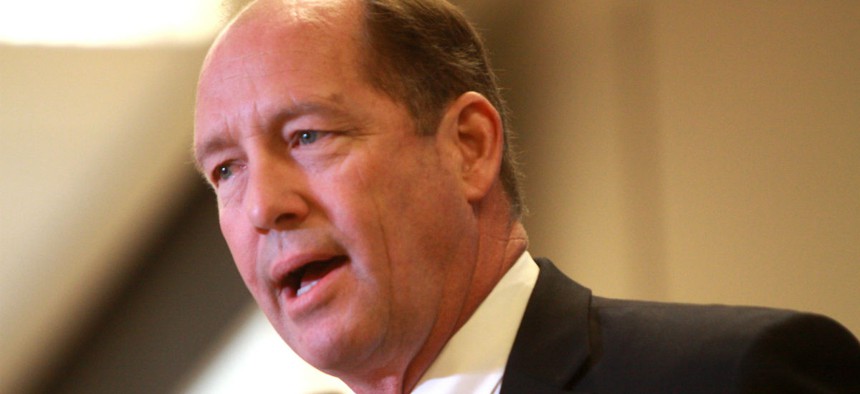Conservative Lawmakers Push for Expedited Firings Across Government
Employees would be suspended without pay while pursuing limited appeal options.
A group of conservative lawmakers introduced legislation on Thursday to expedite the disciplinary process throughout the federal government, saying the measure would boost accountability.
The bill, introduced by Rep. Ted Yoho, R-Fla., and cosponsored by Reps. Louie Gohmert, R-Texas; Steve King, R-Iowa; and Randy Weber, R-Texas, would limit the time federal employees have to appeal a negative personnel action and restrict the number of appeals they could file to just one. Agencies would suspend employees without pay throughout the appeal process.
Employees would have seven days to appeal to the Merit Systems Protection Board a firing, suspension or other action. MSPB would then have 45 days to issue a ruling on the appeal. If the board did not act in that timeframe, then the agency’s decision would stand.
In an interview with Government Executive, Yoho said the shortened procedure would “make people be more proactive.” He said Congress has repeatedly heard from agency heads that it is “virtually impossible to fire anybody.” Leaders at the National Park Service, Secret Service, Veterans Affairs Department, Environmental Protection Agency and Drug Enforcement Administration have all asked lawmakers for greater latitude in removing problem workers.
“It hurts the morale in the agency when they know they have a bad player and they see them getting transferred laterally” rather than fired, Yoho said. The current system has ushered in a culture of “protectionism,” he added.
The congressman said “in the real world,” private sector employees would be fired immediately in cases in which federal workers are merely suspended.
The legislation is similar to a measure that passed the House last year that would apply only to employees at the Veterans Affairs Department. Rep. Jeff Miller, R-Fla., with whom Yoho said he worked in drafting his proposal, sponsored that bill. Yoho said he also consulted with the Congressional Research Service.
Due process for most of the federal workforce now requires that agencies notify employees within 30 days of an adverse action (including removal), and provide them with seven days to respond and an opportunity to defend themselves. The average initial MSPB appeal takes about 90 days.
Yoho said he expects certain factions to criticize his bill for removing federal employees’ due process protections, but preemptively combated that argument by saying feds would still have the right to an appeal. An employee who became the victim of a bad manager carrying out a personal vendetta would still be protected, he said.
“We’re not going to take anything from good employees,” Yoho said.
Recent efforts to ease the firing of federal employees, targeting VA’s senior executives, have stalled after the Justice Department decided not to defend attempted reforms in court due to concerns over constitutionality. VA has said it will no longer use the authority Congress granted it in 2014 to quickly remove top managers accused of wrongdoing, sending lawmakers back to the drawing board.
Yoho said he has not consulted with Rep. Jason Chaffetz, R-Utah, who has focused on the federal employee discipline issue as chairman of the House Oversight and Government Reform Committee. Chaffetz has yet to propose legislation aimed directly at the firing process, but did usher through the House a measure to limit -- in most cases -- paid administrative leave for employees under investigation to 14 days.
(Image via Flickr user Gage Skidmore)
NEXT STORY: An Early Democratic Convention Lineup




